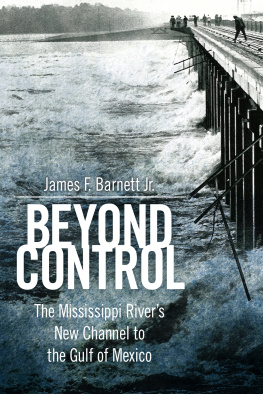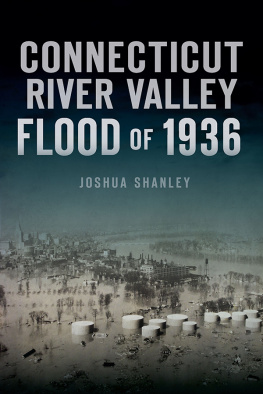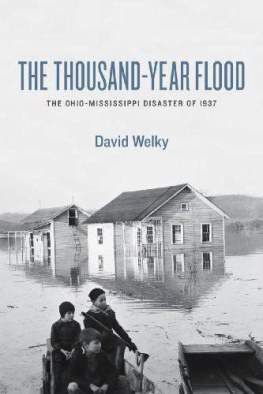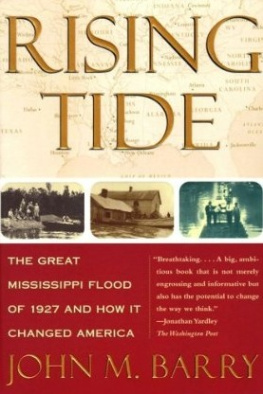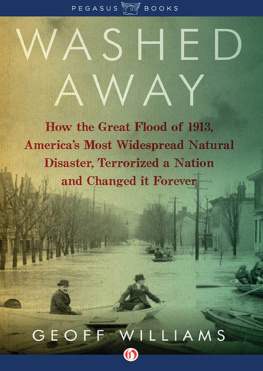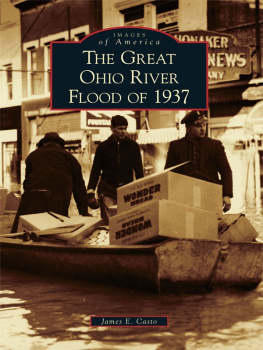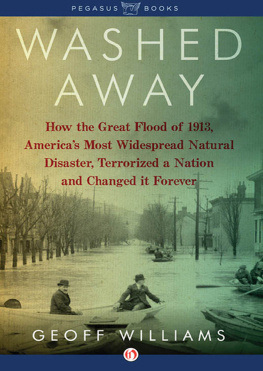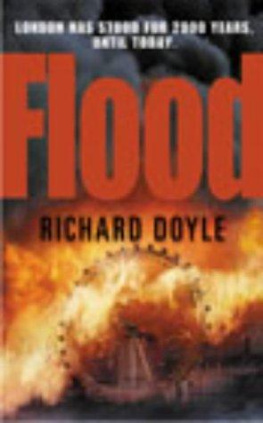THE 1,000-YEAR FLOOD


Copyright 2010 by Stephen J. Lyons
ALL RIGHTS RESERVED. No part of this book may be reproduced or transmitted in any form by any means, electronic or mechanical, including photocopying and recording, or by any information storage and retrieval system, except as may be expressly permitted in writing from the publisher. Requests for permission should be addressed to Globe pequot press, Attn: Rights and permissions Department, p.o. Box 480, Guilford, CT 06437.
A small portion of this book first appeared in a slightly different form in American Way magazine.
Test design: Sheryl p. Kober
Layout: Sue Murray
project editor: John Burbidge
Map: M. A. Dub Morris Book publishing, LLC
photos by Stephen J. Lyons unless otherwise noted.
Library of Congress Cataloging-in-publication Data
Lyons, Stephen J.
The 1,000-year flood : destruction, loss, rescue, and redemption along the Mississippi River / Stephen J. Lyons.
p. cm.
Includes bibliographical references.
ISBN 978-0-7627-5270-6
1. FloodsSocial aspectsMississippi River. 2. Emergency managementMississippi River Valley. 3. Disaster reliefMississippi River Valley. 4. Water quality management Mississippi River Valley. I. Title. II. Title: one thousand year flood.
HV6102008. M575 2010
363.34930977dc22
2010020108.
Printed in the United States of America
10 9 8 7 6 5 4 3 2 1
ALSO BY STEPHEN J. LYONS
Landscape of the Heart: Writings on Daughters and Journeys A View from the Inland Northwest: Everyday Life in America
In memory of my grandparents, Charles and Georgia Uchytil And for all the residents of Cedar Rapids and the Midwest affected by the floods of 2008

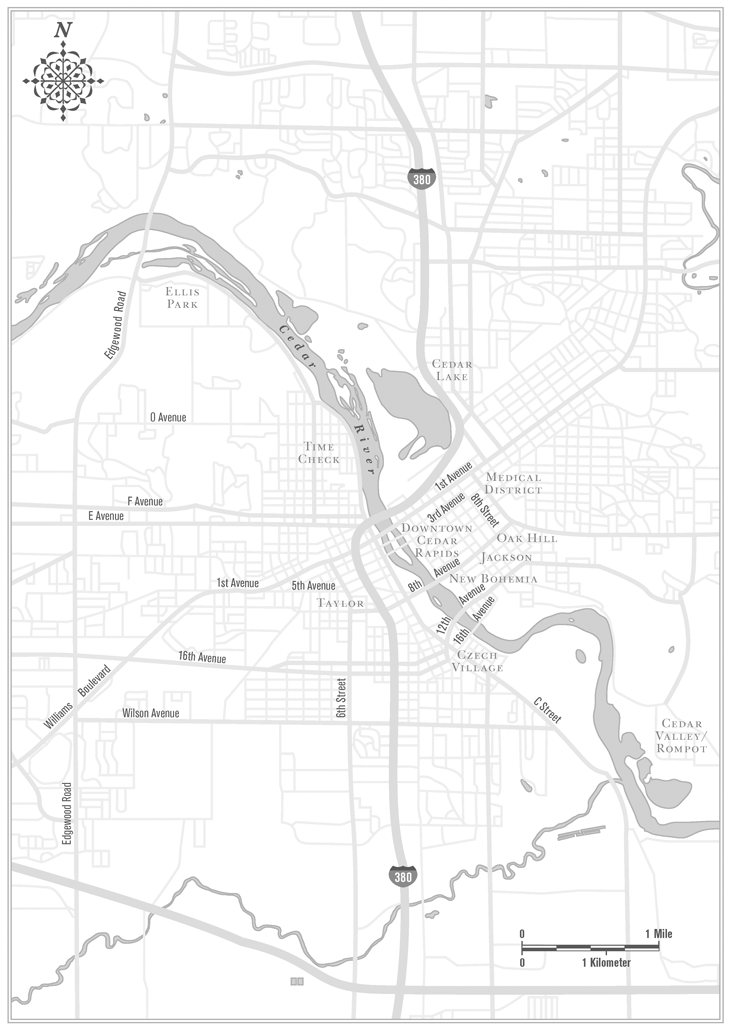
OVERVIEW OF FLOODED NEIGHBORHOODS
PROLOGUE
Floods change the way we see everything.
JANE VARLEY, FLOOD STAGE AND RISING
June 13, 2009, Cedar Rapids, Iowa
On the first anniversary of the second 500-year flood in the Midwest in fifteen years and fifth worst state disaster in the history of the United States, everything had changed and nothing had changed. We gathered in Sunner Park on the banks of the muddy Cedar River1 on an ash-colored morning in remembrance of the exact moment the waters reached 31.12 feet,2 11.12 feet over the previous record of 20 feet set in 1851 and in 1929.
On this day the river limped along at 6.66 feet.3 Looking at the slack water, it seemed inconceivable that a year ago ten square miles, 14 percent, of this eastern Iowa city of 124,000 were underwater, resulting in more than 5,390 houses damaged and the displacement of 18,623 citizens, including 1,800 school kids. Job losses were estimated at 1,360. Forty-five registered day-care providers were affected, requiring the parents of 1,547 children to find new day-care facilities. Fifteen hundred houses will eventually be demolished. Total damage to the city was estimated at between $5.2 and $6 billion, but that number kept changing depending on whom you asked and when you asked them. One hard number was $2.4 billion in damage to public infrastructure and future flood management options. The citys infrastructure, from city hall to municipal courts to fire and police headquarters to the main library, was flooded. Miraculously, not one death was recorded.
Church bells were set to ring across the city at 10:00 a.m. to mark the approximate time of the historic crest, but I couldnt hear them over the whipping wind. The American Legion Hanford Post #5 had posted the American and Iowa state flags, but they both toppled over as Cassie Willis, the citys public information officer, began her greeting.
One year ago today, our city suffered the worst natural disaster in its history. This ceremony will mark that historical event, honor those who survived and those who are helping it recover and recognize our progress so far... Today we remember the power of Mother Nature, and we memorialize the power of the human spirit.
Reverend Harlan Gillespie of St. Pauls United Methodist Church then led us in prayer:
O God,
By the waters of the Cedar we have been for almost two centuries; And through the seasons of winter, spring, summer, and fall, You have brought about the promise of seeds scattered and sown into the harvest of joy.
On this anniversary of the crest of the Flood of 2008 we remembernot only the darkness with the welling up of the waters of river and tears; but also the human spirit that you have implanted within us, that caused a harvest of sincere work and mutual presence of neighbor and newfound friends from across the country and abroad.
We pray for one anothers continued recovery.
We pray for those still displaced from their homes.
We pray for those who have found a home to shelter and nurture them.
We pray for neighborhoods and relationships built upon trust and respect.
We pray for those who protect us and serve us that we might partner with them.
We pray for the medical and faith communitieswho seek to heal us in body, soul, mind, and spirit with your divine presence.
We pray for the schools, that children may be whole and loved.
We pray for the business lost and those recovering and the people whose lives have been deeply affected.
We pray for leaders and their faithfulness and clarity of sight.
We pray for the day-to-day quiet offerings of healing and hope in the countless number of persons who listen, give, receive, share.
We pray for today and for the futureand that we might remember in ways that do not tear us down but encourage and build us up so that we might cherish today and face the future unafraid.
Give us your courage, strength, and compassion so that the days ahead may be what You intend for this community, rich in history, textured deeply with character and many cultures.
By the time Reverend Gillespie said Amen, the low light of morning had spread across the small crowd. The sky, the river, the park, our faces all held a gray pallor. Across the river rose the downtown skyline, a nondescript cluster of buildings that only the most faithful would call inspiring or picturesque.
Greg Eyerly, the citys new flood recovery director, would say later that summer, We dont make sexy products. We make starch that goes into paper; we make foodstuffs, ingredients in crackers and cereal. We make ethanol. The sexiest thing we make is Capn Crunch. Were not a beachfront property. We make an anonymous contribution to our country, and people forget about us.4
Indeed, looking across the river, nothing felt normal. The center was not holding. This was supposed to be a commemoration, but instead it had all the emotional baggage of a wake.
I tuned in and out to the speakers. No one mentioned the sunflowers that had sprouted throughout the city in the weeks after the crest. Sunflowers sprouted in cracked sidewalks and rose out of driveways. Sunflowers reached for light from the sides of houses where seeds had become lodgedas the drywall rotted, the seeds took over. Nobody knew the origin of the seeds. Some people speculated that they had arrived from a plant upriver or had spilled and been distributed from the hundreds of bird feeders caught up in the rivers fury. Residents said they looked quite striking against the dark backdrop of flood-ravaged homes. They represented hope.5


